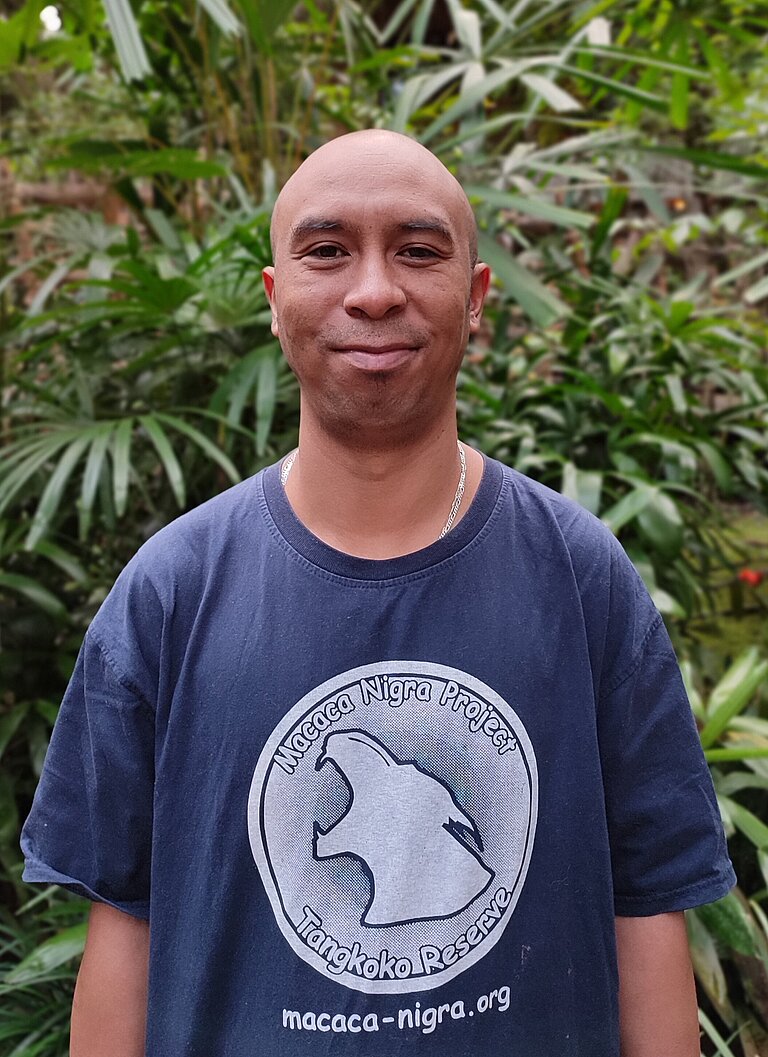Rija Andriamifidy

Position: PhD student
University of Leipzig
Faculty of Life Sciences
Institute of Biology
Behavioral Ecology Research Group
Talstraße 33
D-04103 Leipzig
Germany
and
Max Planck Institute for Evolutionary Anthropology
Department of Human Behavior, Ecology and Culture
Deutscher Platz 6
D-04103 Leipzig
Germany
E-mail: rija_andriamifidy@[>>> Please remove the text! <<<]eva.mpg.de
Current research
Nowadays, nearly 60% of all primate species are threatened with extinction. As many primates share their habitat with humans, direct conflicts between humans and primates, e.g., over food resources, are common. Consequently, these conflicts may lead to a higher number of injuries even an increased mortality among wildlife, with a possible long-term reduction in fitness. Therefore, it is vitally important to understand how primates may flexibly adjust their behaviour in response to anthropogenic changes. My PhD project investigates the behavioural flexibility of crested macaques (Macaca nigra) at Tangkoko Nature reserve, a critically endangered species endemic to Sulawesi (Indonesia), in face to anthropogenic pressures. My work has three objectives: 1) investigating how primate sociality is affected by human disturbances, 2) unravelling how human disturbance critically influence the social development of primate infants and 3) understanding how human disturbance may influence primate individual fitness, e.g., reproductive success (number of offspring produced) and infant mortality (survival of offspring) which also affects population size and hence the survival of the species. To address these objectives, available long-term behavioural data from birth to sexual maturation, in concert with ecological and GPS data of crested macaques provided by the MNP (Macaca Nigra Project) will be analysed to investigate the level of behavioural flexibility of this species in response to human disturbance. Crested macaques are especially interesting in this regard, as most of our knowledge on primate sociality and behavioural flexibility is restricted to despotic and intolerant primate species. However, crested macaques represent one of the few highly tolerant primate species, with a large degree of freedom in their sociality suggesting that they also have a higher potential for behavioural flexibility and adaptation. My project will be the first investigating the effects of human disturbances on sociality and fitness in crested macaques.
Curriculum vitae
Present Position
| since 04/2023 | PhD student at the Institute of Biology, University of Leipzig, in the Research Group of Behavioural Ecology of Prof. Dr. Anja Widdig Dissertation title: Primate survival in the Anthropocene: behavioural flexibility to human disturbance of crested macaques, a critically endangered species on Sulawesi |
Past position
| 03/2023-06/2023 | Research assistant at the Institute of Biology, University of Leipzig, in the research group of Behavioural Ecology led by Prof. Dr. Anja Widdig |
| 10/2022-02/2023 | Tutor of Statistic course for the module “Quantitative methods in Life Science” for BSc and MSc students |
| 11/2021-08/2022 | Research assistant at the Institute of Biology, University of Leipzig, in the research group of Behavioural Ecology led by Prof. Dr. Anja Widdig |
| 08/2018-12/2020 | Research assistant at the Biogeography department, University of Bayreuth, in the research group of Vector Borne Disease led by Prof. Dr. Carl Beierkuhnlein |
Education
| 10/2015-09/2018 | Master of Science in Global Change Ecology at the University of Bayreuth, Germany Thesis title: “Impact of spatial resolution on the performance of species distribution models considering three administrative scales”. Supervisor: Dr. Anja Jaeschke, Prof. Dr. Carl Beierkuhnlein (University of Bayreuth) |
| 08/2011-04/2014 | Master of Science in Animal Biology, Ecology and Conservation (with focus on Primate Behaviour and Ecology) at the University of Antananarivo, Madagascar Thesis title: "Territoriality towards neighbouring groups and stranger groups (“Nasty neighbour effect” of Verreaux’s sifaka (Propithecus verreauxi) in Kirindy’s forest-Morondava, Madagascar during the offseason” Supervisor: Dr. Claudia Fichtel (University of Göttingen, DPZ), Dr. Hanta Razafindraibe (University of Antananarivo) |
| 10/2005-08/2019 | Bachelor of Science in Biology at the University Mohamed V, Rabat, Morocco Thesis title: "Les techniques en Immunologie" Supervisor: Dr. Bellaoui (University Mohamed V) |
Field experience and Internship
| 09/2017-12/2017 | Field Research/Intern in the Dolphin Montenegro’s project hosted by the Marine Mammal Research Association, Montenegro. |
| 06/2016-07/2017 | Field school in Conservation Biology with the Greek’s Summer School, Ano Pedina Forest, Greece. |
| 06/2014-07/2014 | Field school in Biodiversity Conservation offered by the Tropical Biology Association (TBA) in Kibale forest, Uganda. |
| 10/2012-12/2012 | Field school in Biodiversity Conservation offered by the RESPECT Project (University of Helsinki), in Ranomafana Forest, Valbio Center, Madagascar. |
| 04/2012-06/2012 | Field school in Primate Behaviour offered by the Deutsches Primatenzentrum (DPZ) in Kirindy forest, Morondava, Madagascar under the supervision of Prof Dr Peter Kappeler and Dr Claudia Fichtel. |
Funding and Awards
| Since 04/2023 | PhD scholarship awarded by the Friedrich Naumann Foundation (FNF) |
| 11/2021-03/2022 | Graduate funding awarded by the State of Saxony, Leipzig, Germany |
| 2004-2009 | BSc Scholarship awarded by the Moroccan Agency of International Cooperation, Morocco |
Publications
Andriamifidy RF, Tjaden NB, Beierkuhnlein C, Thomas SM. Do we know how mosquito disease vectors will respond to climate change? Emerg. Top. Life Sci. 2019; 3(2):115–132